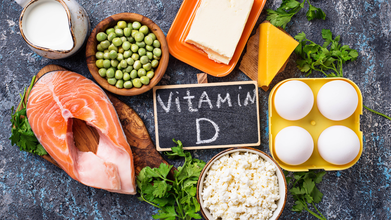- Health Conditions A-Z
- Health & Wellness
- Nutrition
- Fitness
- Health News
- Ayurveda
- Videos
- Medicine A-Z
- Parenting
Eating Too Fast In A Rush? Here's What Damage It's Doing

Image Credit: Canva
Do you ever finish a meal and wonder whether you've really tasted it? Eating has often become an accessory activity, shoehorned into the margins of a hectic life. You eat on the run at breakfast, over coffee during meetings, or multitask over dinner with your screens. Most of us have lost our sense of pace while eating.
Fast eating does not just deprive you of the enjoyment of your food; it could also disrupt very important processes within your body and lead to some physical discomforts, digestive problems, and health issues in the long run. Taking more time and enjoying food can be such a luxury; it is however worth the try since it greatly affects your health. Understanding why it is so wrong to consume too fast-and how to deal with this can give you a good chance at re-gaining control over the habits of consuming food and create a healthier eating habit.
Let's take a closer look at what happens when you eat too fast and discuss strategies for adopting a more mindful approach to eating.
Why is Eating Too Fast A Problem?
1. Digestive Distress
When you eat too fast, your digestive system can't keep up. Chewing is the first step in the digestion process, breaking food into smaller pieces and mixing it with saliva to help it absorb. If this step is rushed, then your stomach has to work much harder to break down inadequately chewed food.
The outcome? Discomfort. Among those who regularly gobble their food, the most common symptoms are gas, bloating, nausea, and acid reflux. Indigestion caused by speed-eating can be felt as a heavy, burning sensation, which makes you uncomfortably full and regretful of the hasty meal, the U.S. National Library of Medicine reports.
2. Overeating and Weight Gain
One of the most serious problems with overeating is that it disrupts your body's hunger and fullness signals. It takes approximately 20 minutes for your stomach to communicate to your brain and signal that you are full. When you rush through eating, you consume more food before the message is received, which usually results in overeating.
Research supports this: a review published in the International Journal of Obesity found a strong association between fast eating and higher BMI. People who eat quickly are more likely to consume excess calories, contributing to weight gain over time. Slowing down allows your body to recognize when you’ve had enough, helping to maintain a healthy weight.
3. Disconnect From Hunger and Fullness Cues
Rushing through meals dulls the body's natural ability to regulate hunger and fullness. If you eat too quickly, it becomes more challenging for your brain to store good memories of what you have eaten, which might influence how much you eat later in the day. This disconnection from your body's signals not only affects your relationship with food but also increases the possibility of overeating later in the day.
Moreover, mindful eating — the practice of paying full attention to the experience of eating — enhances your ability to enjoy meals and recognize when you’re satisfied. Without mindfulness, food becomes less of a sensory experience and more of a task to complete.
4. Long-Term Health Risks
Speed-eating is not just a short-term problem; it can lead to long-term health problems. Several studies have connected fast eating with metabolic syndrome, a group of conditions that increase the risk of heart disease, stroke, and diabetes. According to a 2018 study published in BMC Public Health, people who eat quickly are at a higher risk of developing high blood pressure, elevated cholesterol, increased belly fat, and high blood sugar levels.
These long-term risks underscore the value of adopting a slower eating pace, not only for your comfort in the immediate moment but also for your overall health and longevity.
Also Read: 7 Genius Hacks To Lose Weight And Feel Full Without Starving Yourself
How to Slow Down? Practical Tips for Mindful Eating
Chewing your food slowly is one of the easiest ways to slow down. It aids digestion, enhances the sensory experience, and gives your brain time to catch up with your stomach's signals. Aim for at least 20 to 30 chews per bite, depending on the texture of the food.
Try eating with your fork or spoon in one hand and setting it down between bites. That small habit might make you eat more mindfully and avoid overeating. Eating in front of a TV or computer often results in mindless, frantic eating. Any time you can, sit at a table, put away distractions, and attend to your meal.
Start with a moderate amount so you're not feeling too full and not tempted to gobble it down. If you still feel hungry after you finish your plate, wait a few minutes to see if you want more.
If this is hard to do, then start a 20-minute timer and challenge yourself to get through your meal that long. Eventually, you will establish a natural cadence in eating.
When to Seek a Dietitian
If you are unable to slow down or feel guilty or ashamed about your eating habits, you should consider consulting a registered dietitian. They can help you identify the reasons behind your behavior and develop a personalized plan to support healthier eating practices.
Eating slowly is not just about enjoying your food; it is an important part of overall health. Mindful eating can help improve digestion, maintain a healthy weight, and reduce the risk of chronic health issues. It's not about being perfect; it's about progress. Small changes in eating habits can lead to significant long-term benefits, making every meal a step toward better health and well-being.
Take a deep breath, set down your fork, and enjoy the process-your body will thank you for it.
Indigestion. NIH
Association between eating rate and obesity: a systematic review and meta-analysis. Int J Obes (Lond). 2015
Slow Down: Behavioural and Physiological Effects of Reducing Eating Rate. Nutrients. 2018
Association between self-reported eating speed and metabolic syndrome in a Beijing adult population: a cross-sectional study. BMC Public Health. 2018
Epstein Files Reveal Secret Muffin Recipe: All You Need To Know

Credit: Canva
As the United States Department of Justice continues to release the harrowing Epstein Files that lift the lid on years' worth of horrific crimes by the convicted American child sex offender, serial rapist and human trafficker, eagle eyed readers have noticed a unique breakfast item in the documents.
In a file titled 'J.E.E Operating Manual', experts found a 11-step muffin recipe named 'J.E.E. Muffin Recipe' that the felon insisted should be served to him every morning at 6.30am.
The Epstein files are over six million pages of documents, images and videos detailing the criminal activities of the financier and his social circle of public figures that included politicians and celebrities.
His co-conspirator Ghislaine Maxwell, who is also a convicted child sex trafficker and sometimes referred to as the "Lady of the House" is serving a 20-year prison sentence at a minimum-security prison camp in Texas.
What Is The J.E.E. Muffin Recipe?
To start off, the recipe involves 12 ingredients which are:
- 4 extra large eggs
- 3 cups Dark brown sugar
- 3/4 cup Olive Oil
- 4 cups Digestive Bran
- 5 cups Whole Wheat Flour
- 12/ cup Ground Flax Seed Mixture
- 12/ cup Flax Seeds
- 5 tsp. Baking Soda
- 1/4 tsp. Salt
- 1 cup Raisins
- 4 cups Whole Milk
- 1 tsp. Vanilla Extract
1. In a large bowl combine bran, flour, flax seeds, baking soda and salt
2. Beat eggs and sugar in the bowl of an electric mixer until thick and creamy.
3. Add oil to egg/sugar mixture and mix to combine. Also combine milk and vanilla and set aside.
5. Add flour and milk mixtures to egg/sugar mixture, alternating additions until combined. Do not over beat mixture.
6. Add raisins and stir until incorporated.
7. Pour mixture into an airtight plastic container and store in the refrigerator for 24 hours before using.
8. Grease large muffin tin with Pam Spray.
9. Fill tins to the top with mixture and top with chopped nut/sugar/flax .
10. Bake at 350 degrees F. for 35-45 minutes.
11. Combine chopped pecans, walnuts and almonds, wheat germ, flax seeds and brown sugar for muffin toppings
While public speculation runs rampant over why this digestion-friendly muffin recipe was a critical part of Epstein's daily routine, as many allege and theorize that it was fed to the children on his island, nutritionists claim that this bran-packed muffins can help your body in multiple ways.
Why Is This Muffin Recipe Good For Your Gut?
Dr. Anshul Singh, Team Lead, Clinical Nutritionist, Artemis Hospitals noted that this baked good is packed with tons of fiber, omega-3, iron and antioxidants, all of which are extremely beneficial for the body.
He tells Healthandme: "People often call this muffin recipe a high-fiber muffin and it is good for your health in small amounts. The fact that this recipe has a lot of fiber is its best quality.
"Digestive bran, whole wheat flour, ground flaxseed and whole flax seeds are all high in dietary fiber. Fiber helps with bowel movements, constipation and overall gut health. Fibre makes stool thicker which makes digestion easier and more regular.
"Flaxseeds also have omega-3 fatty acids which can lower inflammation and improve heart health. Raisins add natural sweetness, iron and antioxidants while eggs and milk add protein that keeps you full longer. Olive oil has healthy fats that help with digestion and the absorption of vitamins that dissolve in fat.
"These muffins might help people who have trouble with slow digestion or irregular bowel movements, especially if they drink enough water with them. But calling them detox or clean-out foods can be misleading. The liver and kidneys are two of the body's organs that help get rid of toxins. The fiber in these muffins is what really helps the digestive system work better.
"The recipe has a lot of sugar and fiber, so it's important to watch how much you eat. A muffin can be a filling, easy-to-digest snack instead of a cure-all."
However, Zoha Shaikh, Consultant Nutritionist at Nutriiya, warns that these muffins may also cause stomach issues including bloating, gas, acid reflux and diarrhea.
She told this publication: "This muffin recipe is rich in fibre and may help relieve constipation in individuals with low fibre intake. However, the combination of very high fibre, sugar, and milk can also trigger bloating, gas, abdominal cramping, loose stools and acid reflux especially in sensitive individuals.
"The high use of baking soda contributes to increased sodium load, making it unsuitable for people with hypertension. From a clinical nutrition perspective, replacing wheat bran with oat bran, reducing baking soda, moderating flaxseed quantity and adding psyllium husk can make the recipe more gut-friendly. Eggs and psyllium together also improve texture and fluffiness while being gentler on digestion."
Is February Feeling Gloomy Without Sunlight? Add These Foods In Your Diet To Avoid Vitamin D Deficiency

Credits: Canva
February often feels like winter’s longest stretch. The days are short, the sun rarely breaks through the clouds, and many people find themselves feeling unusually tired or low. Health experts say this is also the time of year when vitamin D deficiency tends to surface, especially in regions with limited winter sunlight.
While vitamin D is best known for its role in bone health, its impact goes far beyond that. As sunlight exposure drops in late winter, attention is turning to how diet can help support the body until brighter days return.
Why Vitamin D Matters for the Body
Vitamin D plays a key role in several essential functions. It helps the body absorb calcium, which is crucial for maintaining strong bones and teeth. It also supports normal muscle function and keeps the immune system working efficiently.
What is less widely discussed is its role in brain health. Vitamin D receptors are present in many areas of the brain, and low levels have been linked to changes in mood and energy. During winter, many people report feeling sluggish, unmotivated, or emotionally flat. While these symptoms are often blamed on stress or lack of sleep, reduced sunlight and falling vitamin D levels may also contribute.
Why Winter Increases the Risk of Deficiency
The body produces most of its vitamin D when the skin is exposed to sunlight. In winter, shorter days, heavy clothing, and more time spent indoors mean that this natural process slows down significantly. Even people who eat well can struggle to maintain optimal levels during prolonged periods of low sun exposure.
This is where food choices can offer some support, even if they cannot fully replace sunlight.
Fatty Fish as a Natural Boost
Salmon is one of the richest natural sources of vitamin D. It also provides high quality protein and healthy fats that support heart and brain health. Simple meals like oven baked salmon with potatoes and broccoli or a salmon rice bowl with vegetables make it easy to include in weekly meals.
Herring is another strong option. It contains both vitamin D and omega 3 fatty acids, which are known to support heart health. Traditional combinations such as herring with boiled potatoes or a light yogurt based sauce are both nourishing and filling.
Everyday Foods That Add Up
Eggs also contribute small amounts of vitamin D, mainly from the yolk. While they do not provide as much as fatty fish, they are easy to include in daily meals. Scrambled eggs, vegetable omelettes, or a soft boiled egg at dinner can all help increase intake over time.
Mushrooms are one of the few plant based foods that contain vitamin D, especially when they have been exposed to light. They are not a replacement for fish but can be a helpful addition for those who eat little or no seafood.
Food Helps, but Sunlight Still Matters
Nutrition can support vitamin D levels during winter, but it cannot fully make up for the lack of sunlight. Most vitamin D is still produced through the skin, not the diet. Experts advise making the most of daylight when possible, even short walks outdoors, while using food as a supportive measure until spring arrives.
Expert Reveals Why You Keep Gaining Weight Despite Barely Eating

(Photos: Canva)
Recent insights from medical experts show that even people who eat very less can gain weight due muscle mass, stress, and their body’s movement during the day.
Dr Mohit Bhandari, a robotic bariatric and endoscopic weight loss surgeon, founder and director of Mohak Bariatrics and Robotics at Bhandari Hospital Indore notes some people eat whatever they want without gaining weight, while others struggle even with dieting.
The secret lies in the complex interplay of genetics, metabolism, and environmental factors that influence weight management.
This is why are you are putting on weight, according to Dr Bhandari:
1. Metabolism Differences
Studies have shown that metabolic factors are involved in the development of obesity and that being overweight is not simply a result of "sloth and gluttony."The speed at which the body burns calories is different for every individual. A slower metabolism means that even consuming small amount of food can lead to gain.
Individuals with high level of physical activity are less likely to be obese as they mean calories quicker.
2. Hormonal And Lifestyle Factors
Many women experience weight gain during menopause due to a drop in estrogen levels and subsequently fat distribution. This can lead to risk of heart diseases, Type-2 diabetes and joint problems.Hormones like thyroid hormones, cortisol, and play a major role in weight regulation. Stress, lack of sleep and Insulin sensitivity are also factors that lead to fat storage in the body.
3. Loss Of Muscle Mass
When muscle mass decreases due to ageing, inactivity or illness, it often causes a decline in physical activity, which further lowers daily energy expenditure.Consuming a snack rich in carbohydrate with 10-20 grams of protein before and immediately after strength training sessions further acts as a responsible factor in gaining weight.
4. Gut Health And Digestion
Poor digestion can also trigger inflammation, which interferes with blood sugar levels.Additionally, it can also trigger inflammation, which interferes with normal metabolism and insulin function, encouraging fat storage.
© 2024 Bennett, Coleman & Company Limited

